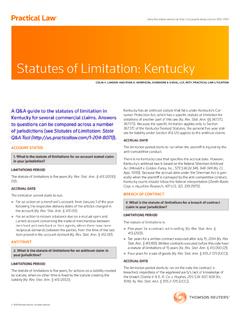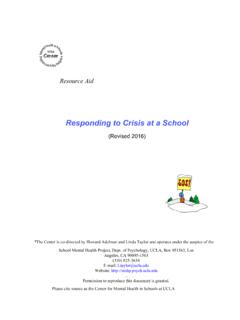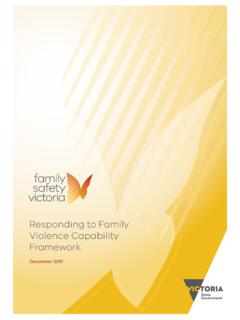Transcription of Responding to a Complaint: Ohio - Dinsmore & Shohl
1 2014 Thomson Reuters. All rights Q&A guide to Responding to a complaint in a trial court of general jurisdiction in Ohio. This Q&A addresses the time to respond, extend-ing the time to respond, pre-answer motions, answers, replies to the answer, counterclaims, crossclaims, third-party claims (also known as impleader) and defensive OF Responding TO A STATE COMPLAINT1. When must a defendant respond to the complaint?In Ohio, a defendant must respond within 28 days after being served the summons and complaint or after completion of service by publi-cation (Ohio Civ.)
2 R. Rule 12).2. How, if at all, can one obtain an extension of time to respond (for example, by stipulation, so-ordered stipulation, ex parte motion, motion on notice)?In Ohio, each county's Court of Common Pleas typically publishes local rules governing extensions of time. Some local rules allow automatic extensions of time, often for up to 20 days. Other local rules allow for extensions of time by stipulation, while still others require Court approval. To obtain an extension of time to respond, the county's individual local rules must be What types of responses are permitted (for example, answer, motion, demurrer, special appearance)?
3 In Ohio, the following types of responses are permitted: An answer (Ohio Civ. R. 12(A)). A motion for a definite statement (Ohio Civ. R. 12(E)). A motion to strike (Ohio Civ. R. 12(F)). A motion to dismiss, commonly referred to as a Rule 12(B) motion (Ohio Civ. R. 12(B)).PRE-ANSWER RESPONSES4. If motions, demurrers or the like are permitted: Are there any preliminary requirements (for example, meet and confer with the plaintiff's counsel, have a conference with the court)? What grounds can be asserted (for example, subject matter jurisdiction, personal jurisdiction, failure to state a claim)?
4 Are available grounds that are not asserted waived (either just for pre-answer litigation or for the whole case)? What papers are required (for example, notice of motion, motion, affidavit, memorandum of law)? Can the defendant offer evidence outside the complaint? When and how does the plaintiff respond? Can the defendant reply? If so, when and how? Does the court hear oral argument before deciding? Is discovery stayed until the court decides? If the court does not dismiss the complaint, how much time does the defendant have to file an answer?
5 MOTION TO DISMISS (RULE 12(B) MOTION)PreliminaryOhio abolished demurrers (Ohio Civ. R. 7(C)). No general preliminary requirements exist except as provided by local rule. Counsel should check the applicable local rules to determine whether the court im-poses any preliminary requirement. Grounds AsertedThe defendant may present the following defenses in a motion to dismiss: Lack of subject matter jurisdiction. Lack of personal jurisdiction. Improper venue. Insufficiency of process. Insufficiency of service of process.
6 Failure to state on claim for which relief can be granted. Failure to join a necessary to a Complaint: OhioSETH ALAN SCHWARTZ, Dinsmore & Shohl , WITH PRACTICAL LAW LITIGATIONView the online version at 2014 Thomson Reuters. All rights reserved. 2 Responding to a Complaint: Ohio(Ohio Civ. R. 12(B).)WaiverIf a party does not include all Rule 12 defenses in the Rule 12(B) motion, it waives all except the following, which cannot be waived: Lack of subject matter jurisdiction. Failure to state a claim for which relief can be granted.
7 Failure to join a necessary party.(Ohio Civ. R. 12(G), (H).) Required PapersIn Ohio, all motions must include: A caption with: the name of the court; the title of the action; the case number; and a designation of the document being filed.(Ohio Civ. R. 7(B)(3) and 10(A).) A statement, with particularity, of the grounds on which the motion is based. The relief or order sought.(Ohio Civ. R. 7(B).)Local rules typically require parties to file both: A motion. A memorandum in support of the motion (see, for example, Hamilton Co.)
8 , Ohio 14(A)).Some local rules require parties to attach unpublished cases to the memorandum in support (see, for example, Cuyahoga Co., Ohio, Common Pleas Ct. (H)).Outside EvidenceOther than for a motion to dismiss for failure to state a claim on which relief may be granted, outside evidence is allowed and, as the court permits, evidentiary hearings may be allowed. Concerning a motion to dismiss for failure to state a claim on which relief can be granted, if a defendant presents matters outside of the pleading and the court allows it, the court must: Treat the motion as a motion for summary judgment Dispose of the motion as provided in Rule 56 of the Ohio Civil Rules of Procedure.
9 (Ohio Civ. R. 12(B).)Response by PlaintiffsCounsel should check the applicable local rules to determine the time frame for the plaintiff's memorandum in opposition. Reply by DefendantsCounsel should check the applicable local rules to determine whether: A defendant may file a reply absent leave of court. If allowed, the deadline for any ArgumentCounsel should check the applicable local rules to determine whether the court will hear oral local rules require parties to request an oral argument in their motion (see, for example, Tuscarawas Co.)
10 , Ohio, Ct. of Common Pleas 4(H)).Stay of DiscoveryA motion to dismiss does not automatically stay an Answer or Other ResponseIf the court denies the motion to dismiss, the defendant(s) must serve their answer within 14 days after notice of the court's action (Ohio Civ. R. 12(A)).MOTION FOR A DEFINITE STATEMENTP reliminary RequirementsCounsel should check the applicable local rules to determine whether the court imposes any preliminary AssertedA party may move for a definite statement if the pleading is so vague or ambiguous that the party cannot reasonably prepare a response.








